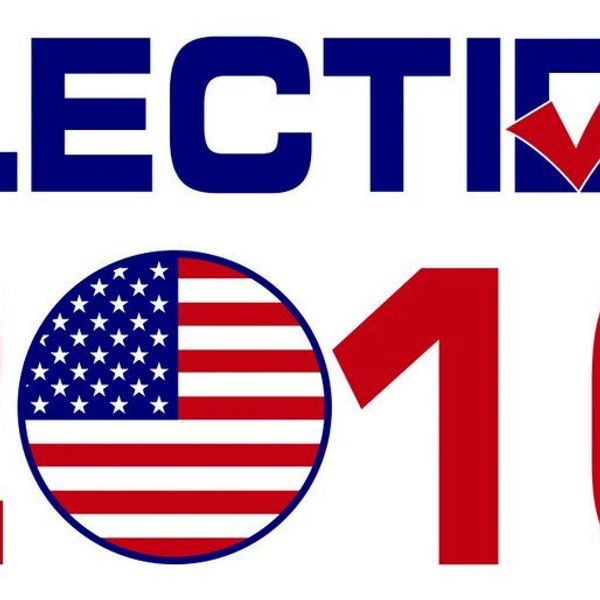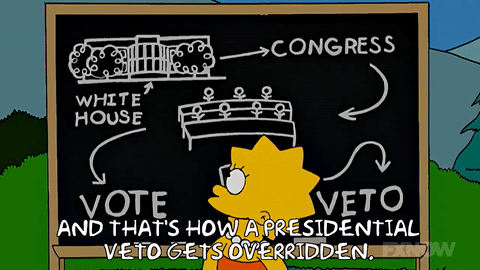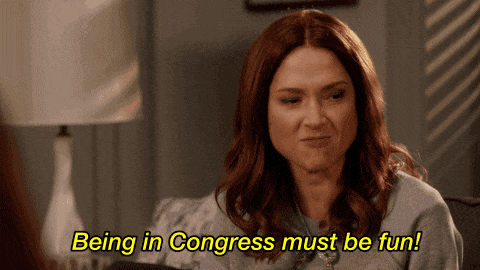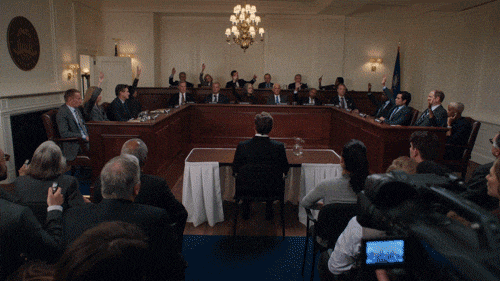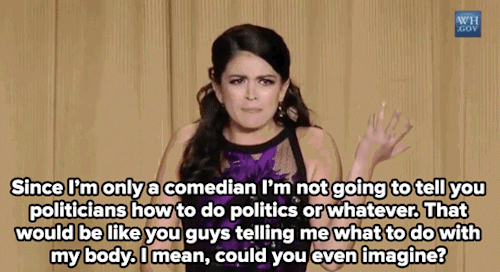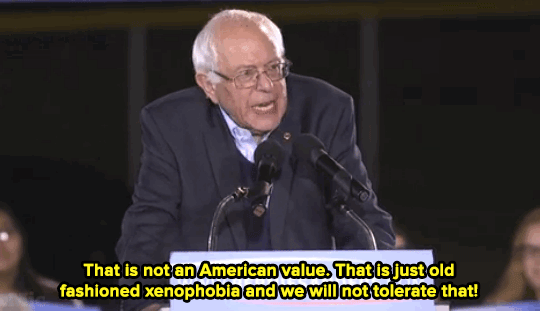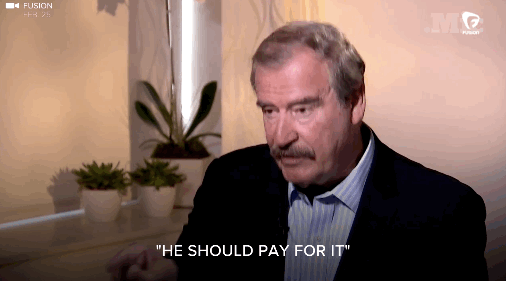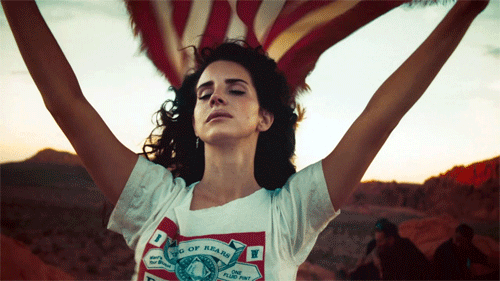We are all on the edge of our seats watching the Presidential debates and wondering what the fate of this country will be, come the new year. Well, here are 11 checks into the realities of presidential power to update our mindset towards the election.
1. The Economy
�
The economy can't actually turn around at the snap of the President's wrinkly fingers! It greatly depends on the actions of other countries including China, the Middle East and European countries such as Greece and Spain who buy our products, subsequently giving us jobs.
2. A President's Veto Can Be Overridden By Congress
After the President commits to a regular veto (the most common type of veto where a bill is sent back to Congress with a message of disapproval) the Congress can override the veto if they achieve votes from two-thirds of each house in favor of passing the bill.
3. The President Doesn't Decide What Laws Will Be Enacted
But rather, the President decides what issues will be discussed. As J.C. Bradbury, Professor at Kennesaw State University puts it in a Freakonomics interview:
"But [the President] does serve as a cheerleader to say, “This is where the policy debate needs to be.” So that all the members of Congress can get together and say, “Here’s where we’re going to argue and here’s where we’re going to reach our decision.” So rather than say setting the line-up or saying exactly what we’re going to do, the president is about: let’s determine which problem we’re going to focus on. And because the media is so focused on him, it gives him that agenda setting power."
4. A President's Perceived Power Is Much More About Leadership
Leadership is what can truly inspire a country. Here, John Ashcroft, former U.S. Attorney General, explains his experience with the importance of Presidential Leadership:
"Leadership, in a moral and cultural sense, may be even more important than what a person does in a governmental sense. A leader calls people to their highest and best. The process of governance is really a way of setting thresholds over which people must go in order to stay out of jail. No one ever achieves greatness merely by obeying the law. People who do much more higher and better and above what the law requires, they become really valuable to a culture, and a president can set a tone that inspires people to do that."
5. The Executive Order
The power embraced by the use of an Executive Order comes from a section in the Constitution where there is a "grant of executive power". The meaning of this phrase has been debated over time, but ultimately, Presidents have used it to enact executive orders by bypassing Congress, who doesn't have to approve it, but also, cannot overturn it. The only power that the Congress has would be to, "pass a law to cut funding for the order's implementation. But even then, the President can veto such a defunding law".
The only way to concretely be rid of an executive order is for the White House to legally reverse it, but only after the President who enacted it, has left office.
6. It Would Be Very Difficult For A President To Make Abortion Illegal
Although a President could pull funding for many family planning organizations and make it increasingly more difficult to find access to abortions, they would have a terribly difficult time finding support to make abortion illegal.
Donald Trump has stated that, "I would defund [Planned Parenthood], because I'm pro-life. But millions of women are helped by Planned Parenthood" and also " I consulted two doctors I respect and, upon learning more about this procedure, I have concluded that I would support a ban".
But in order to actually ban abortion, Trump would need to have a Constitutional amendment passed that gives fetus's the legal status of person hood. This requires that 75% of Congress be in agreement with the amendment and, although amendments of this type have been attempted within the borders of many states, it has failed every time.
Another way to criminalize abortion would be to overturn Roe v. Wade which "established abortion as an issue of women's constitutionally-protected right to privacy". Trump will most likely appoint a Republican, pro-life Supreme Court Judge, but regardless of whether or not there is a Republican or Democratic Supreme Court Judge, Roe v. Wade has been upheld for 43 years. In 2013,The Wall Street Journal/MSNBC found that there is a 70% public opposition (an all time high) to overturning the decision making it seem unlikely that Roe v. Wade would be overturned anytime soon.
7.) If There Is A Party Majority In Congress Opposite Of The President's Party Affiliation, It Could Make It Very Difficult To Enact Bills.��
As we all know, the majority Republican Congress that was in place during Obama's Presidency made it very difficult for him to pass his more Democratic interests.
Not only are we electing a President this year, but seats in the House and Senate are also up for reelection this November, so it is important to pay attention to who your local representatives are and to be in support of those who have the same values as you do!
8. The President Doesn't Have Absolute Power When It Comes To Banning Certain Groups Of People From Immigrating Into The United States
���
Although the President does have the right to propose a ban on immigration, it still has to be passed by Congress. And while Congress has, in the past, approved bans on immigration, these bans were on much smaller groups of people (such as Communists or those who have committed war crimes) than those who are spoken about in the current debates: Muslims.
9. A President Cannot Officially Declare War
Although a President can send troops to battle without an official declaration of war, the power to declare war is in the hands of Congress.
James Wilson, one of the United States' founding fathers is quoted saying this about the Constitution's stance on war:
"This system will not hurry us into war; it is calculated to guard against it. It will not be in the power of a single man, or a single body of men, to involve us in such distress; for the important power of declaring war is vested in the legislature at large: this declaration must be made with the concurrence of the House of Representatives: from this circumstance we may draw a certain conclusion that nothing but our interest can draw us into war."
10. A President Can't Just Force Another Country To Pay For A Wall
Trump's plan to build a wall along the U.S.-Mexico border is one of his most talked about goals. He states that it would cost $8-$12 billion to build it, while media researchers find that his plan would cost between $5.1 and $25 billion to execute.
His plan to pay for the wall is to give Mexico an ultimatum, to which the Mexican President, Enrique Peña Nieto, promply responded "no way" (above is business man and former Mexican President, Vincente Fox Quesada). This ultimatum asks Mexico to pay the costs for the wall up front, or else, Trump would enact amendments to the Patriot Act, making it difficult for undocumented immigrants to send money made in the United States, back to Mexico. Trump states that Mexico receives $24 billion from individuals in the United States and uses this number as leverage as to why Mexico would be better off making a "one-time payment of $5 [billion]-10 billion to ensure that $24 billion continues to flow into their country year after year". This $24 billion, however, is not proven to be money sent to Mexico solely by undocumented immigrants and immigrants could find ways around this amendment, such as giving their money to legal immigrants to send back to Mexico for them.
Trump also states that in order to raise money for the wall he will up the taxes on trade between Mexico and the United States, but Politifact proved that they would hardly generate any new income, as last year Mexico actually sold the United States $54 billion more in goods and services than we sold to Mexico and would actually do harm to Americans. For example, Ford is in the process of moving all automobile manufacturing to Mexico, which would result in consumers having to pay the additional 35% tax on the cars after they move across the border into America.
And again, to pass these proposed tariff laws, the President would need the support of Congress.
11. The Constitution Was Created By Leaders Who Never Wanted Any One Person To Have Absolute Power
Ted Koppel from NPR said:
"The fact of the matter is that what is one of the aspects of greatness of the American Constitution and of the American system is precisely that it is designed to prevent any one man or woman from having exclusive power.
So the presidency is inhibited by the Congress; the Senate, which operates on a six-year cycle, is a lot more lethargic in terms of the way it gets things done than the house is, and part of the greatness, as my former colleague from ABC, George Will, likes to say all the time, 'part of the greatness of the United States is precisely the fact that no one has either exclusive or total power, and that includes the president.'"

